tow VAUXHALL MOKKA 2016 Owner's Manual
[x] Cancel search | Manufacturer: VAUXHALL, Model Year: 2016, Model line: MOKKA, Model: VAUXHALL MOKKA 2016Pages: 231, PDF Size: 6.55 MB
Page 20 of 231
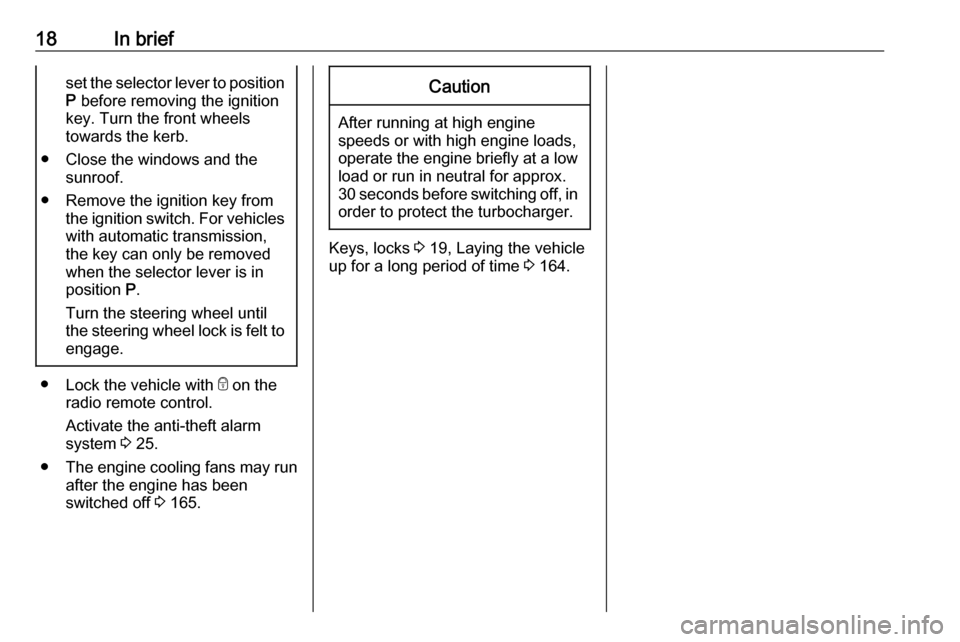
18In briefset the selector lever to positionP before removing the ignition
key. Turn the front wheels
towards the kerb.
● Close the windows and the sunroof.
● Remove the ignition key from the ignition switch. For vehicleswith automatic transmission,the key can only be removed
when the selector lever is in
position P.
Turn the steering wheel until the steering wheel lock is felt to
engage.
● Lock the vehicle with e on the
radio remote control.
Activate the anti-theft alarm
system 3 25.
● The engine cooling fans may run
after the engine has been
switched off 3 165.
Caution
After running at high engine
speeds or with high engine loads,
operate the engine briefly at a low load or run in neutral for approx.30 seconds before switching off, in
order to protect the turbocharger.
Keys, locks 3 19, Laying the vehicle
up for a long period of time 3 164.
Page 45 of 231

Seats, restraints43оборудованном фронтальной
подушкой безопасности, если
ПОДУШКА НЕ ОТКЛЮЧЕНА! Это
может привести к СМЕРТИ или
СЕРЬЕЗНЫМ ТРАВМАМ
РЕБЕНКА.
NL: Gebruik NOOIT een achterwaarts
gericht kinderzitje op een stoel met
een ACTIEVE AIRBAG ervoor, om
DODELIJK of ERNSTIG LETSEL van het KIND te voorkomen.
DA: Brug ALDRIG en bagudvendt
autostol på et forsæde med AKTIV
AIRBAG, BARNET kan komme i
LIVSFARE eller komme ALVORLIGT
TIL SKADE.
SV: Använd ALDRIG en bakåtvänd
barnstol på ett säte som skyddas med en framförvarande AKTIV AIRBAG.
DÖDSFALL eller ALLVARLIGA
SKADOR kan drabba BARNET.
FI: ÄLÄ KOSKAAN sijoita taaksepäin
suunnattua lasten turvaistuinta
istuimelle, jonka edessä on
AKTIIVINEN TURVATYYNY, LAPSI
VOI KUOLLA tai VAMMAUTUA
VAKAVASTI.NO: Bakovervendt
barnesikringsutstyr må ALDRI brukes
på et sete med AKTIV
KOLLISJONSPUTE foran, da det kan
føre til at BARNET utsettes for
LIVSFARE og fare for ALVORLIGE
SKADER.
PT: NUNCA use um sistema de
retenção para crianças voltado para
trás num banco protegido com um AIRBAG ACTIVO na frente do
mesmo, poderá ocorrer a PERDA DE VIDA ou FERIMENTOS GRAVES na
CRIANÇA.
IT: Non usare mai un sistema di
sicurezza per bambini rivolto
all'indietro su un sedile protetto da
AIRBAG ATTIVO di fronte ad esso:
pericolo di MORTE o LESIONI
GRAVI per il BAMBINO!
EL: ΠΟΤΕ μη χρησιμοποιείτε παιδικό
κάθισμα ασφαλείας με φορά προς τα πίσω σε κάθισμα που προστατεύεται
από μετωπικό ΕΝΕΡΓΟ ΑΕΡΟΣΑΚΟ, διότι το παιδί μπορεί να υποστεί
ΘΑΝΑΣΙΜΟ ή ΣΟΒΑΡΟ
ΤΡΑΥΜΑΤΙΣΜΟ.PL: NIE WOLNO montować fotelika
dziecięcego zwróconego tyłem do
kierunku jazdy na fotelu, przed
którym znajduje się WŁĄCZONA
PODUSZKA POWIETRZNA.
Niezastosowanie się do tego
zalecenia może być przyczyną
ŚMIERCI lub POWAŻNYCH
OBRAŻEŃ u DZIECKA.
TR: Arkaya bakan bir çocuk emniyet
sistemini KESİNLİKLE önünde bir
AKTİF HAVA YASTIĞI ile
korunmakta olan bir koltukta
kullanmayınız. ÇOCUK ÖLEBİLİR
veya AĞIR ŞEKİLDE
YARALANABİLİR.
UK: НІКОЛИ не використовуйте
систему безпеки для дітей, що
встановлюється обличчям назад,
на сидінні з УВІМКНЕНОЮ
ПОДУШКОЮ БЕЗПЕКИ, інакше це
може призвести до СМЕРТІ чи
СЕРЙОЗНОГО ТРАВМУВАННЯ
ДИТИНИ.
HU: SOHA ne használjon hátrafelé
néző biztonsági gyerekülést előlről
AKTÍV LÉGZSÁKKAL védett ülésen,
mert a GYERMEK HALÁLÁT vagy
KOMOLY SÉRÜLÉSÉT okozhatja.
Page 66 of 231

64Storage
Arrange mounting brackets as shownin the illustration.
Swivel handle ( 1) sidewards to
disengage and lift the rack ( 2).
Fold the rack backwards, then push
forwards until it stops ( 1).
Press the rack down at the rear ( 2).
Fold in wheel recess
Fold in wheel recess. Fasten strap.
Stow the strap retainers accurately.
Unlock the rear carrier system
Swivel both clamping levers inwards
as far as they will go. Fasten strap.
Fold in tail lamps
Remove both screws. Pull tail lamps
out of the retainer and swivel them
forwards.
Push the tail lamps into the retainer
and reinstall screws to fix the lamps
Fold in number plate holder
Lift the number plate holder and fold
it forwards.
Page 67 of 231
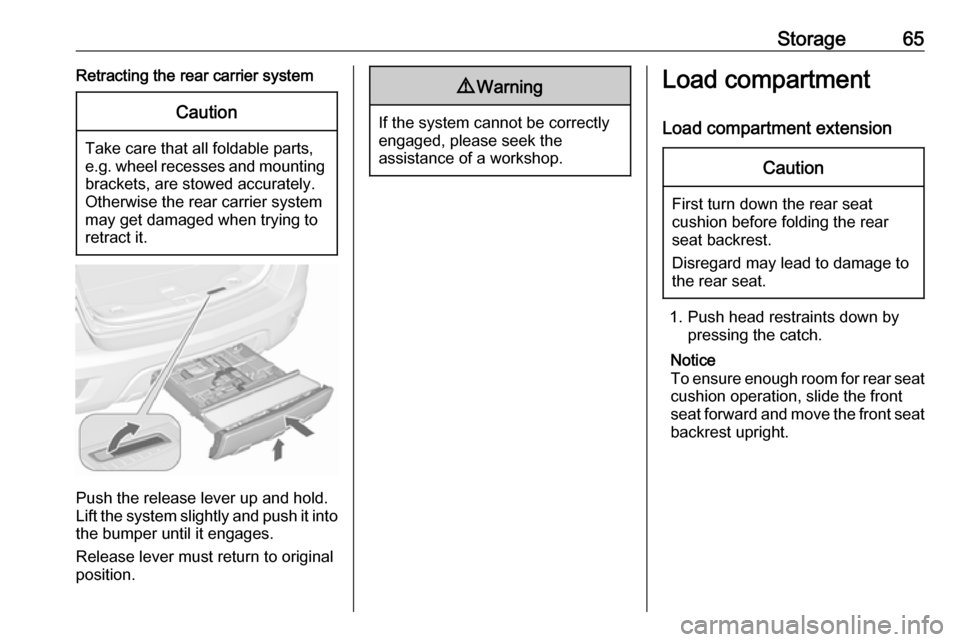
Storage65Retracting the rear carrier systemCaution
Take care that all foldable parts,
e.g. wheel recesses and mounting
brackets, are stowed accurately.
Otherwise the rear carrier system
may get damaged when trying to
retract it.
Push the release lever up and hold.
Lift the system slightly and push it into
the bumper until it engages.
Release lever must return to original
position.
9 Warning
If the system cannot be correctly
engaged, please seek the
assistance of a workshop.
Load compartment
Load compartment extensionCaution
First turn down the rear seat
cushion before folding the rear
seat backrest.
Disregard may lead to damage to
the rear seat.
1. Push head restraints down by pressing the catch.
Notice
To ensure enough room for rear seat
cushion operation, slide the front
seat forward and move the front seat backrest upright.
Page 70 of 231

68StorageMount the cover to the hook at the
sidewall.
Lashing eyes
The lashing eyes are designed to secure items against slippage, e.g.
using lashing straps or luggage net.
Warning triangle
Stow the warning triangle below the
floor cover in the load compartment. Secure it with the strap.
First aid kit
Stow the first aid kit in the storage
compartment at the left sidewall of the load compartment.
Roof rack system
Roof rack
The roof rack has side rails attached
to the roof.
For safety reasons and to avoid
damage to the roof, the vehicle
approved roof rack system is
recommended. For further
information contact your workshop.
Page 71 of 231

Storage69Loading information● Heavy objects in the load compartment should be placed
against the seat backrests.
Ensure the backrests are
securely engaged. If objects can
be stacked, the heavier objects
should be placed at the bottom.
● Secure objects with lashing straps attached to the lashing
eyes 3 68.
● Secure loose objects in load compartment to prevent sliding.
● When transporting objects in the load compartment, the backrestsof the rear seats must not beangled forward.
● Do not allow the load to protrude above the upper edge of the
backrests.
● Do not place any objects on the load compartment cover or theinstrument panel, and do not
cover the sensor on top of the
instrument panel.● The load must not obstruct the operation of the pedals, parking
brake and gear selector, or
hinder the freedom of movement
of the driver. Do not place any
unsecured objects in the interior.
● Do not drive with an open load compartment.9Warning
Always make sure that the load in
the vehicle is securely stowed.
Otherwise objects can be thrown
around inside the vehicle and
cause personal injury or damage
to the load or vehicle.
● The payload is the difference between the permitted gross
vehicle weight (see identification
plate 3 208) and the EC kerb
weight.
To calculate the payload, enter
the data for your vehicle in the
weights table at the front of this
manual.
The EC kerb weight includes
weights for the driver (68 kg),
luggage (7 kg) and all fluids (fuel
tank 90% full).
Optional equipment and
accessories increase the kerb
weight.
● Driving with a roof load increases
the sensitivity of the vehicle to
cross-winds and has a
detrimental effect on vehicle
handling due to the vehicle’s
higher centre of gravity.
Distribute the load evenly and
secure it properly with retaining
straps. Adjust the tyre pressure
and vehicle speed according to
the load conditions. Check and
retighten the straps frequently.
Do not drive faster than 75 mph.
● The permissible roof load is 75 kg. The roof load is the
combined weight of the roof rack and the load.
Page 112 of 231
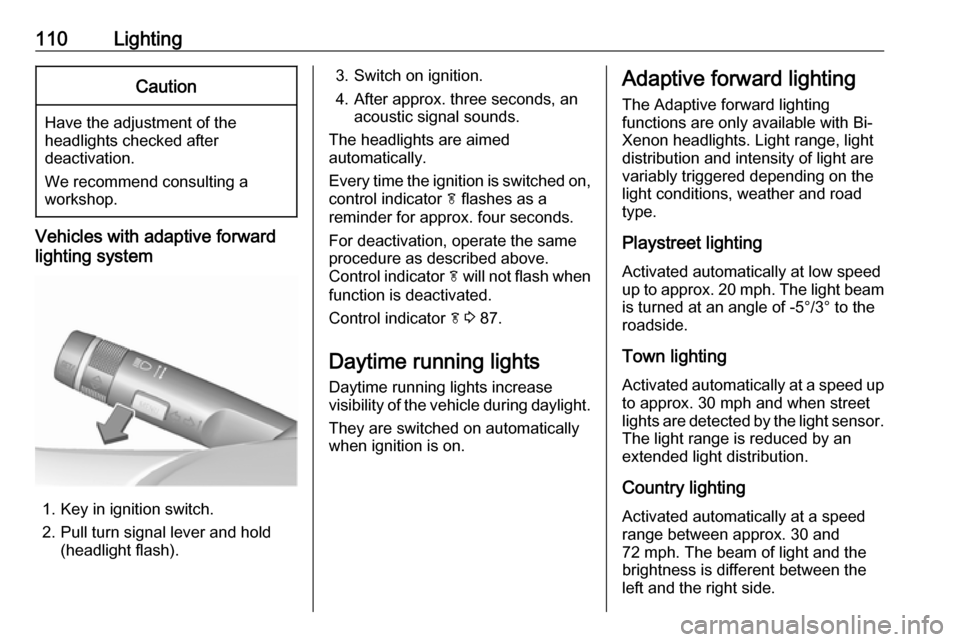
110LightingCaution
Have the adjustment of the
headlights checked after
deactivation.
We recommend consulting a
workshop.
Vehicles with adaptive forward
lighting system
1. Key in ignition switch.
2. Pull turn signal lever and hold (headlight flash).
3. Switch on ignition.
4. After approx. three seconds, an acoustic signal sounds.
The headlights are aimed
automatically.
Every time the ignition is switched on,
control indicator f flashes as a
reminder for approx. four seconds.
For deactivation, operate the same
procedure as described above.
Control indicator f will not flash when
function is deactivated.
Control indicator f 3 87.
Daytime running lights
Daytime running lights increase
visibility of the vehicle during daylight.
They are switched on automatically
when ignition is on.Adaptive forward lighting
The Adaptive forward lighting
functions are only available with Bi-
Xenon headlights. Light range, light
distribution and intensity of light are
variably triggered depending on the
light conditions, weather and road
type.
Playstreet lighting
Activated automatically at low speed
up to approx. 20 mph. The light beam
is turned at an angle of -5°/3° to the
roadside.
Town lighting Activated automatically at a speed up
to approx. 30 mph and when street
lights are detected by the light sensor. The light range is reduced by an
extended light distribution.
Country lighting
Activated automatically at a speed
range between approx. 30 and
72 mph. The beam of light and the
brightness is different between the
left and the right side.
Page 119 of 231
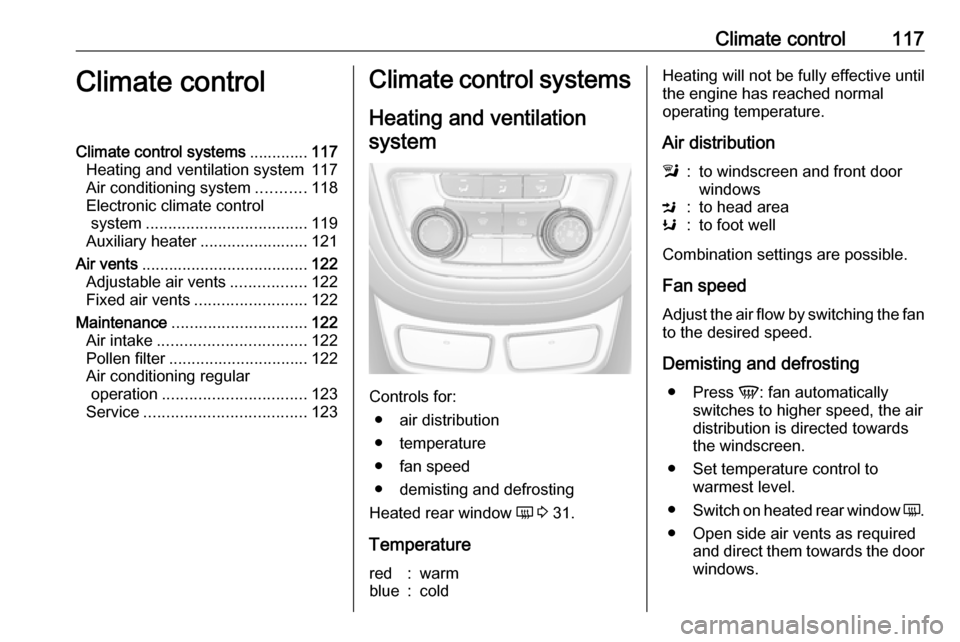
Climate control117Climate controlClimate control systems.............117
Heating and ventilation system 117
Air conditioning system ...........118
Electronic climate control system .................................... 119
Auxiliary heater ........................121
Air vents ..................................... 122
Adjustable air vents .................122
Fixed air vents ......................... 122
Maintenance .............................. 122
Air intake ................................. 122
Pollen filter ............................... 122
Air conditioning regular
operation ................................ 123
Service .................................... 123Climate control systems
Heating and ventilation system
Controls for: ● air distribution
● temperature
● fan speed
● demisting and defrosting
Heated rear window Ü 3 31.
Temperature
red:warmblue:coldHeating will not be fully effective until
the engine has reached normal
operating temperature.
Air distributionl:to windscreen and front door
windowsM:to head areaK:to foot well
Combination settings are possible.
Fan speed
Adjust the air flow by switching the fan
to the desired speed.
Demisting and defrosting ● Press V: fan automatically
switches to higher speed, the air
distribution is directed towards
the windscreen.
● Set temperature control to warmest level.
● Switch on heated rear window Ü.
● Open side air vents as required and direct them towards the doorwindows.
Page 121 of 231
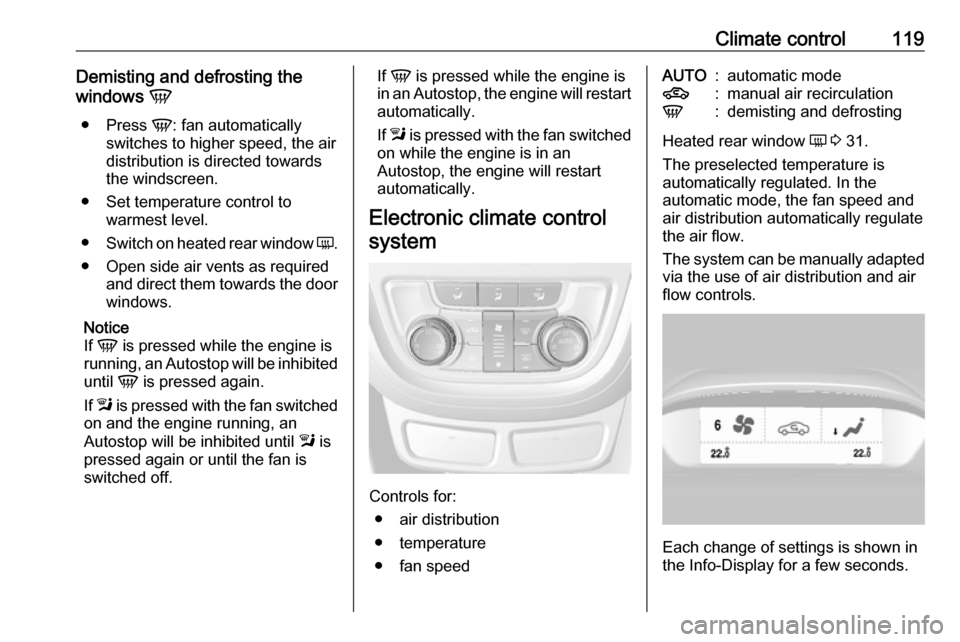
Climate control119Demisting and defrosting the
windows V
● Press V: fan automatically
switches to higher speed, the air
distribution is directed towards
the windscreen.
● Set temperature control to warmest level.
● Switch on heated rear window Ü.
● Open side air vents as required and direct them towards the doorwindows.
Notice
If V is pressed while the engine is
running, an Autostop will be inhibited
until V is pressed again.
If l is pressed with the fan switched
on and the engine running, an
Autostop will be inhibited until l is
pressed again or until the fan is
switched off.If V is pressed while the engine is
in an Autostop, the engine will restart automatically.
If l is pressed with the fan switched
on while the engine is in an
Autostop, the engine will restart
automatically.
Electronic climate control system
Controls for: ● air distribution
● temperature
● fan speed
AUTO:automatic mode4:manual air recirculationV:demisting and defrosting
Heated rear window Ü 3 31.
The preselected temperature is
automatically regulated. In the
automatic mode, the fan speed and
air distribution automatically regulate
the air flow.
The system can be manually adapted via the use of air distribution and air
flow controls.
Each change of settings is shown in
the Info-Display for a few seconds.
Page 126 of 231

124Driving and operatingDriving and
operatingDriving hints ............................... 125
Control of the vehicle ...............125
Steering ................................... 125
Starting and operating ...............125
New vehicle running-in ............125
Ignition switch positions ...........126
Starting the engine ..................126
Overrun cut-off ........................ 127
Stop-start system ....................127
Parking .................................... 129
Engine exhaust .......................... 130
Diesel particle filter ..................130
Catalytic converter ...................131
Automatic transmission ..............131
Transmission display ...............131
Selector lever .......................... 132
Manual mode ........................... 133
Electronic driving programmes 133
Fault ........................................ 133
Interruption of power supply ....133
Manual transmission ..................134
Drive systems ............................ 135
All-wheel drive ......................... 135Brakes........................................ 136
Antilock brake system .............136
Parking brake .......................... 136
Brake assist ............................. 137
Hill start assist ......................... 137
Ride control systems .................137
Traction Control system ..........137
Electronic Stability Control ......138
Descent control system ...........139
Driver assistance systems .........140
Cruise control .......................... 140
Speed limiter ........................... 141
Forward collision alert .............142
Parking assist .......................... 144
Rear view camera ...................146
Traffic sign assistant ................148
Lane departure warning ..........151
Fuel ............................................ 152
Fuel for petrol engines .............152
Fuel for diesel engines ............152
Fuel for liquid gas operation ....153
Refuelling ................................ 154
Fuel consumption - CO 2-
Emissions .............................. 158
Trailer hitch ................................ 158
General information .................158
Driving characteristics and towing tips .............................. 159Trailer towing........................... 159
Towing equipment ...................160